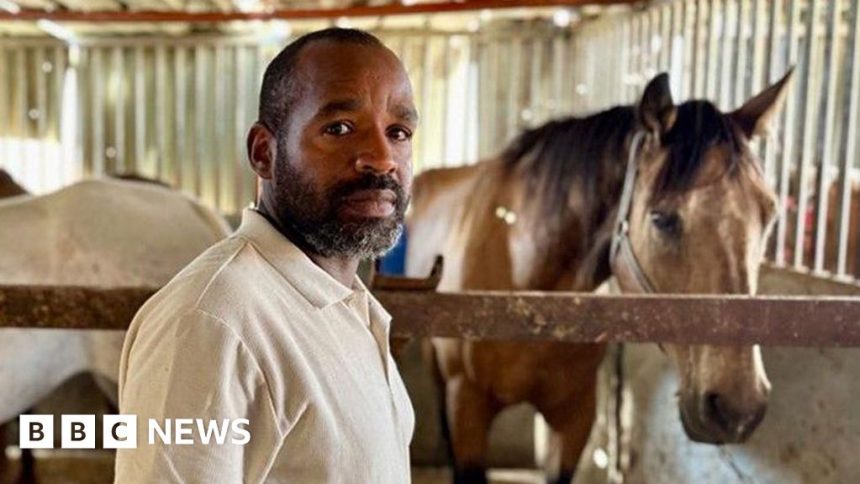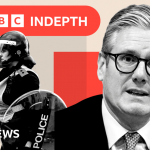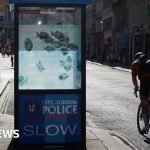Palestinian horse centre vows to rebuild after West Bank demolition
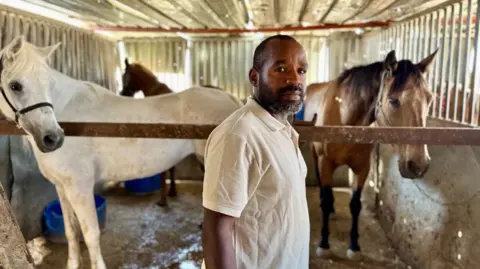 BBC
BBCIt was 07:30 in the morning in late January when Khaled Ifranji received the phone call he had always feared. He had just passed through an Israeli military checkpoint on his way from his home in occupied East Jerusalem to his work in the occupied West Bank, when one of his employees rang to say the Israeli army was “demolishing the stables”.
Khaled had spent the last seven years building the Palestine Equestrian Club – pouring all his money and every waking hour into the project.
The club was built on West Bank land in the Palestinian territories, but in an area which is under full Israeli control.
When Khaled arrived, it was a scene of destruction. There were four diggers demolishing everything.
Khaled says his first concern was that there were still horses inside the stables. A video he shared with the BBC shows a digger striking a building while horses can be seen inside.
When the horses were eventually released, they ran scared across the hillside. Khaled says one was hit by a car.
Khaled asked the soldiers, “Why are you destroying my place?” He says they ignored him. He told them they should be thanking him for the work he does with Palestinian children. “I take away their anger…There’s no guns here. Just sport.”
The Israeli army has confirmed to the BBC the demolition took place on 30 January but disputes Khaled’s allegation that horses were still inside when it happened, despite the video evidence.
They said Israeli security forces and civil administration officials had “removed all the equipment from the compound and evacuated approximately 20 horses”.
They also said the structures had been built illegally, but many Palestinians, like Khaled, say permits are impossible to obtain in this part of the West Bank.
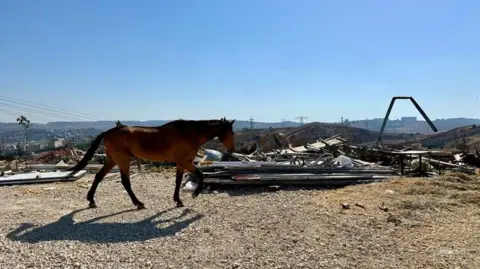
Khaled, who has ridden horses for nearly 30 years, was once a member of the Palestine Equestrian Team, and competed both locally and internationally.
“There’s a connection that can be established between you and horses, often deeper than those formed with humans,” he says.
At the time of its demolition, the equestrian club was just beginning to reach a point Khaled was happy with. He and his team had built a watering system and many of the 30 horses had their own individual stables. They had constructed two arenas, a cafe and a toilet block and the centre was being powered by solar panels and was beginning to be profitable.
One of his younger clients – Shams – has been riding since she was six years old and training with Khaled for nine months now.
“This place is home for me,” she says. “When I’m riding Calypso I feel freedom. The second I ride on him every single stress I have is gone.”
When Shams’ father told her that the centre had been demolished, she was terrified for Calypso.
“I was scared…We have such a strong connection. He’s my whole world.”
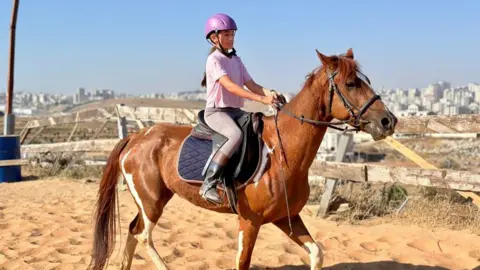
The stables were built on a desolate hill a few kilometres south of Ramallah, the Palestinian administrative capital of the West Bank. It sits out on its own, not close to anything, a feeling of no-man’s land.
As part of the Oslo peace accords between Israel and the Palestinians in the 1990s, occupied West Bank land was split into three categories – Area A under full Palestinian control, Area B under partial Palestinian control and Area C under full Israeli control.
Khaled’s equestrian club is located in Area C, which makes up 60% of the West Bank.
This agreement was supposed to be temporary, but nearly 30 years later it seems to have cemented an Israeli presence.
The Israeli military continues to operate in all areas of the West Bank and settlements have expanded throughout the territory, something most of the international community considers an obstacle to peace and in contravention of international law.
In July, anti-settlement watchdog Peace Now revealed Israel had approved the advance of plans for 5,295 new homes in 12 West Bank settlements as well a seizure of 5 sq miles of West Bank land, making it one of the largest land seizures in 30 years.
The International Court of Justice (ICJ) has said Israel should stop settlement activity in the occupied West Bank and East Jerusalem and end its “illegal” occupation of those areas and the Gaza Strip as soon as possible.
The Israeli Prime Minister Benjamin Netanyahu said the court had made a “decision of lies”.
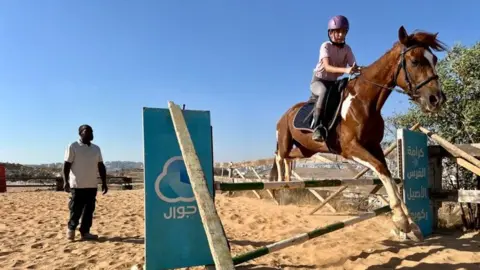
Khaled says Area C is the only place where there is enough space to build something like his club, away from built up areas of cities. Despite renting the land from the Palestinian ministry of religious affairs, he has been unable to get a permit to build as this is controlled by Israel.
In a statement to the BBC, a representative of Cogat, the military division that co-ordinates Israeli government activities in the occupied Palestinian territories, described the demolition of the centre as an “enforcement operation… on a spot where an order forbade construction” and that Khaled’s buildings were in an area “designated as an archaeological site”.
The UN Office for the Coordination of Humanitarian Affairs says it’s “virtually impossible” for Palestinians to obtain building permits, with Peace Now saying that between 2009 and 2018 only 2% of all such requests were permitted in Area C.
This means it is not uncommon for Palestinians to build without an Israeli issued building permit. Many of these unauthorised buildings are at risk of Israeli demolitions.
In 2023, Israeli human rights organisation B’Tselem logged 554 demolitions of Palestinian houses and structures in the West Bank.
Shai Parnes, a spokesperson for the group, said: “Israel’s planning and building policy in the West Bank is aimed at preventing Palestinian development and dispossessing Palestinians of their land.”
The relevant Israeli authority did not respond to this specific allegation.
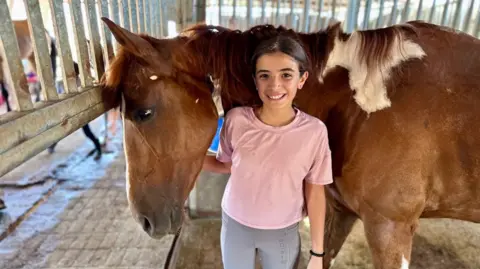
Just a few days after the demolition, Khaled’s friends at the club threw a birthday party for him amongst the wreckage as they began to clear the destruction. It was there and then that they decided they would rebuild. A crowdfunder was quickly set up to raise money for new, temporary structures.
“They began saying to me, ‘We want to build a better club… They demolished this place so we can build a new club even more beautiful than before.'”
Part of Khaled’s busy summer programme involves running activities for kids from low-income families, as well as children with learning difficulties.
Khaled is determined that these sessions will go ahead using the rudimentary structures and arenas they have begun to rebuild.
But as well as this they have had to think of new solutions in case the Israeli authorities do come to demolish again.
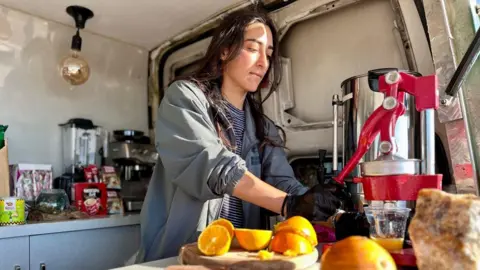
Thirty-year-old Reem, who runs the club’s café, has had to improvise. After the demolition of the cafeteria in January, she came up with a plan to set up a café on wheels, “something mobile that can move from place to place, minimising our losses in case they… demolish the place again”, she says.
With Calypso now safely back in the stables, Shams is undeterred by what has happened and has big ambitions.
“I want to compete in the Olympics for Palestine,” she says.
Khaled continues to coach Palestinian children and is determined to stay on this piece of land whatever happens.
“There is nothing left for me to lose” he says. “If they destroy it today, I will build again tomorrow. If they destroy it tomorrow I will build again the next day. This is my life. I have to continue.”



